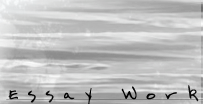|
Think Like William Stafford Does
In his two poems Traveling through the Dark and Tuned In Late One
Night, William Stafford offers his readers two narrators searching
for some kind of ultimate truth. The narrators speak with what seems
like a hard-won moral authority and tell us in different ways that
the decisions they make, perhaps should be our decisions too.
In Travelling through the Dark, Stafford gives us a pragmatic narrator
who needs to make a fateful decision about a pregnant dead deer
s/he finds on a dark and dangerous road. “It is usually best
to roll them into the canyon…” is a line that reveals
the narrator’s matter-of-fact approach to this dead animal
without a hint of sentimentality. “Usually best” leads
us to believe perhaps that the narrator has done this sort of thing
before.
The narrator seems to be knowledgeable, or at least observant. S/he
can tell the corpse is a recent killing, even though the body is
cold and stiff. Just touching the doe’s side reveals the doe’s
pregnancy. The language in the second stanza shows us how capable
this narrator is. The details of the dead doe are given with matter-of-fact
simple language that gives this narrator an air of authority. Also,
the narrator has the strength and presence of mind to carry an injured
full-grown deer off the road. This paints a picture of someone capable,
strong and smart.
We have been shown how capable this narrator is, so we are with
her in the stanza when s/he makes the decision to push the deer
off the road. We know it is a decision s/he thinks we all should
make because Stafford includes us in the making of the decision.
“I thought hard for us all” is universal; this narrator
is acting for all of us, with all the strength we have been shown
throughout the poem. Though this narrator has tried to find another
way for us out of our moral dilemma. Though we would hesitate as
s/he does in her swerving, it is a momentary lapse, done out of
compassion. In the end we are right there too, pushing the deer
over the edge, making the only decision possible. S/he is performing
a service for us and with us.
The structure of this poem makes the impact of the narrators decision
especially strong, adding to the weight as the correct decision.
Stafford gives us four stanzas of four lines each of flowing language
that set the scene and give us details about this narrator. The
fifth and final stanza is two lines only, breaking the rhythm and
giving impact to the image of the decision made and then the deer
being pushed over the edge. The effect is dramatically abrupt and
final.
Tuned In Late One Night gives us another wise narrator making another
decision. This decision, however, is completely internal, a choice
about how to live by being true to oneself. S/he is telling us that
this is how we should live too, that her decisions should be ours.
This speaker, like the speaker in Travelling… seems wise,
like s/he has come through something difficult and now wishes to
share the wisdom of it. The second stanza points to that change
in the character of the narrator. “We learned to wait”
s/he says about the lessons around truth. “Some of us knew
even then it was better to lose”. This persona has gone through
a change by losing. What was a desire for winning, the senses engaged
in attaining the upper hand, changed into a desire for truth. By
seeing this change, we are ready to believe in whatever message
or instruction the first stanza told us this narrator had for us.
So in the third stanza, when s/he starts telling us what s/he believes
truth is, it doesn’t sound like preaching coming from this
humbled and vulnerable speaker, it sounds like hard-earned and revealed
wisdom that we want as our own.
The structure of the stanzas and the language draw us into listening
to this speaker, to giving her a chance. Four stanzas, each beginning
with a statement or a question seem to set us up for a philosophical
argument. The speaker is talking directly to us; what s/he is sharing
is deeply personal. Not only telling us what we should do, but revealing
what s/he has done. That kind of vulnerability inspires trust. In
the fourth stanza, the revelations are so personal, we know we can
trust this narrator, that we should feel as s/he does, because her
personal ambitions are so noble: an open mind, clear thoughts, an
honest tongue, compassion and honesty. How could we not want that
for ourselves?
In tone, the two narrators are similar, perhaps the same. The narrator
of Traveling…is strong and compassionate enough to make hard
decisions for all of us, and the speaker for Tuned In Late One Night
is a more mature voice not just making crucial ethical decisions,
but speaking to us, the reader, about which choices are perhaps
correct for us. We see this voice grow and mature in and between
the poems, so we believe her and know we will make correct choices
for ourselves. We know that we will not be traveling alone in the
dark night.
|

